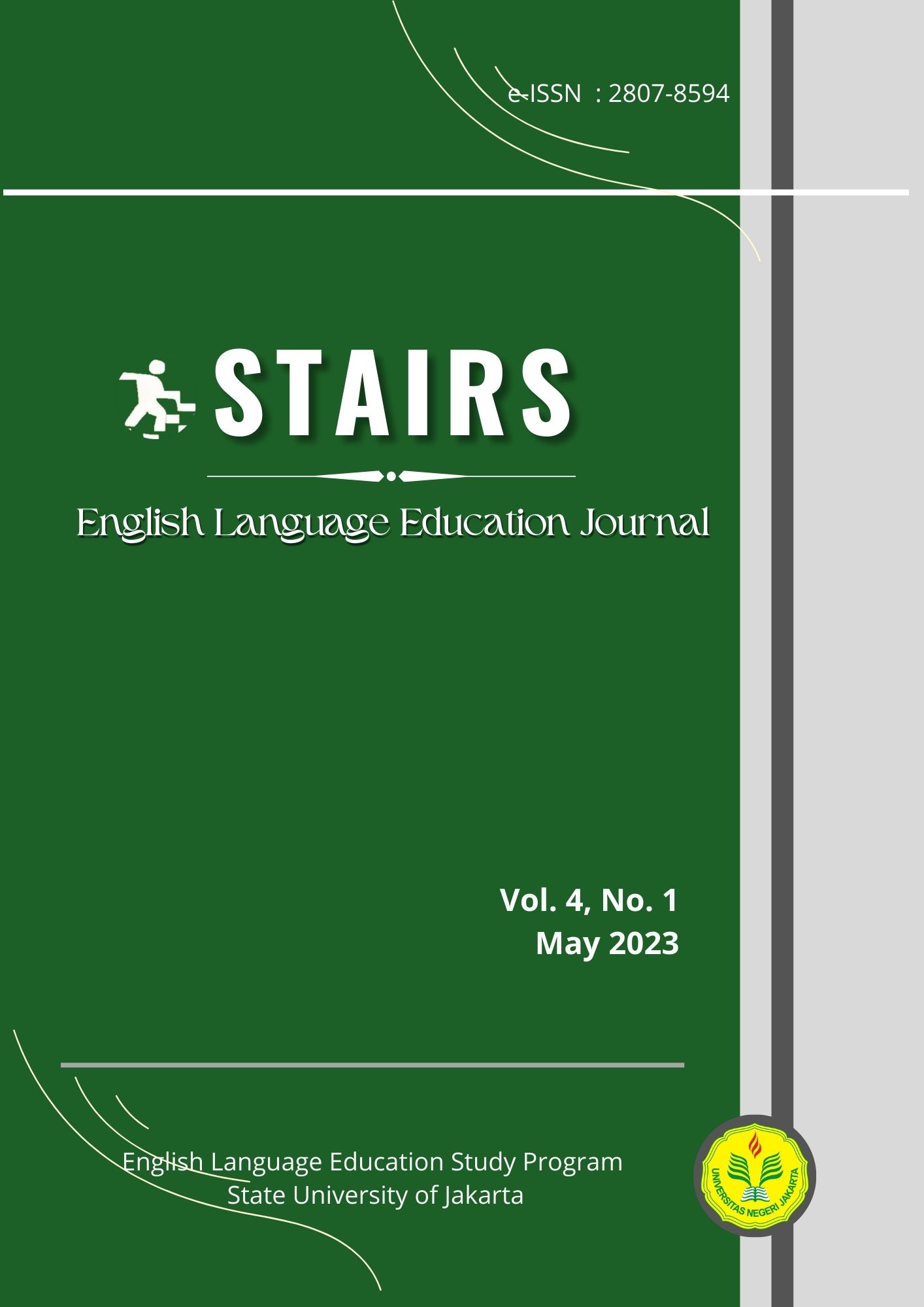Exploring Parents' Perceptions Toward Early Childhood English Language Education in Jakarta
DOI:
https://doi.org/10.21009/stairs.4.1.7Keywords:
early childhood education, English language, language development, parental perceptionsAbstract
This study investigates parents' perceptions of early childhood English language education in Jakarta, Indonesia. With an increasing emphasis on English proficiency in a globalized world, understanding parental attitudes toward introducing English early age is essential. This research employed a mixed-methods approach, utilizing a survey questionnaire to gather insights from 52 parents, consisting of 40 mothers and 12 fathers, whose children were between 3 to 6 years old. The survey revealed that 92% of parents agreed that early English education enhances language development, 88% believed it provides a competitive edge, 83% considered it crucial for opportunities, and 74% saw its potential to boost cognitive skills. In-depth interviews were conducted with 16 participants, selected through purposive sampling, to delve deeper into parental perceptions, providing further insight. The findings underscore parents' collective recognition of the positive impact of early English education on language development and cognitive skills, presenting a valuable resource for parents seeking informed decisions about their children's early language learning journey. The study offers input for educators, policymakers, and curriculum designers aiming to create effective early English programs resonating with parental perspectives.
References
Alawiyah, S., & Santosa, I. (2022). Students’ Perceptions on the Roles of YouTube in Improving English Speaking Skill. IJLECR - International Journal Of Language Education And Culture REVIEW, 8(2), 99–116. https://doi.org/10.21009/ijlecr.v8i2.32135
Al-Mahrooqi, R., Denman, C., & Al-Maamari, F. (2016). Omani Parents’ Involvement in Their Children’s English Education. SAGE Open, 6(1). https://doi.org/10.1177/2158244016629190
Barnett, W. S., & Yarosz, D. J. (2007). N I E E R Who Goes to Preschool and Why Does It Matter? www.nieer.org
Barnett, W. S. (1995). Long-Term Effects of Early Childhood Programs on Cognitive and School Outcomes. In Source: The Future of Children, Vol. 5, Issue 3, http://www.jstor.orgURL:http://www.jstor.org/stable/1602366
Bialystok, E. (2011). Reshaping the mind: The benefits of bilingualism. Canadian Journal of Experimental Psychology, 65(4), pp. 229–235. https://doi.org/10.1037/a0025406
Creswell, J. W., & Creswell, J. D. (2018). Research Design: Qualitative, Quantitative, and Mixed Methods Approaches (5th ed.). California, the USA: SAGE.
Dearing, E., Kreider, H., Simpkins, S., & Weiss, H. B. (2006). Family involvement in school and low-income children’s literacy: Longitudinal associations between and within families. Journal of Educational Psychology, 98(4), pp. 653–664. https://doi.org/10.1037/0022-0663.98.4.653
Díaz, C., Acuña, N., Ravanal, B., & Riffo, I. (2020). Unraveling Parents' Perceptions Of English Language Learning. Humanities & Social Sciences Reviews. 8(2), pp 193-204. https://doi.org/10.18510/hssr.2020.8223
Genesee, F., & Nicoladis, E. (2006). Bilingual First Language Acquisition.
Heckman, J., Pinto, R., & Savelyev, P. (2013). Understanding the mechanisms through which an influential early childhood program boosted adult outcomes. American Economic Review, 103(6), 2052–2086. https://doi.org/10.1257/aer.103.6.2052
Hill, N. E., & Taylor, L. C. (2004). Parental School Involvement and Children’s Academic Achievement Pragmatics and Issues.
Ivanova, I., & Costa, A. (2008). Does bilingualism hamper lexical access in speech production? Acta Psychologica, 127(2), 277–288. https://doi.org/10.1016/j.actpsy.2007.06.003
Liando, N. V. F., & Tatipang, D. P. (2022). English or Indonesian Language? Parents’ Perception Toward Children's Second Language Learning Context. Jurnal Lingua Idea, 13(1), pp. 61-75. https://doi.org/10.20884/1.jli.2022.13.1.5749
Lin, C.-Y., & Chen, H.-C. (2016). Parental Perceptions of Early Childhood English Education. International Journal on Studies in English Language and Literature, 4(11). https://doi.org/10.20431/2347-3134.0411011
Páez, M. M., Tabors, P. O., & López, L. M. (2007). Dual language and literacy development of Spanish-speaking preschool children. Journal of Applied Developmental Psychology, 28(2), 85–102. https://doi.org/10.1016/j.appdev.2006.12.007
Pianta, R. C., Barnett, W. S., Burchinal, M., & Thornburg, K. R. (2009). The effects of preschool education: What we know, how public policy is or is not aligned with the evidence base, and what we need to know. Psychological Science in the Public Interest, Supplement, 10(2), 49–88. https://doi.org/10.1177/1529100610381908
Sénéchal, M., & Lefevre, J.-A. (2002). Parental Involvement in the Development of Children’s Reading Skill: A Five-Year Longitudinal Study. In Child Development (Vol. 73, Issue 2).
Zhang, C. (2021). The Advantages and Disadvantages of Learning a Second Language Early.



